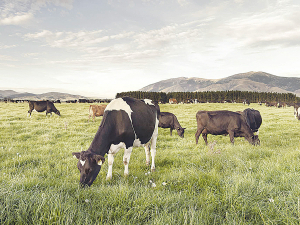Alliance commissions major heat pump system at Mataura, cutting coal use and emissions
Alliance Group has commissioned a new heat pump system at its Mataura processing plant in Southland.
 Between 2022 and 2023, total emissions from agriculture decreased 2.2%, including a 1.6% drop in dairy cattle emissions.
Between 2022 and 2023, total emissions from agriculture decreased 2.2%, including a 1.6% drop in dairy cattle emissions.
Emissions by dairy cattle decreased by 1.6% according to the latest NZ Greenhouse Gas Inventory report.
It shows that between 2022 and 2023, total emissions from agriculture decreased 2.2% which included a 1.6% drop in dairy cattle emissions due to a fall in dairy cow numbers.
DairyNZ general manager Farm Solutions & Policy, Dr David Burger, says this is part of a trend that has seen methane emissions from dairy cattle decrease by 4.11% since 2017. He says DairyNZ statistics show a 3.4% decrease in cow numbers - from 4.84 million in the 2021/22 season to 4.67 million in the 2022/23 season.
“But at the same time, average milk production per cow increased over this same period by 1.8%, up to 393kgMS from 386kgMS,” he says.
Dr Burger says our dairy farmers continue to work hard to improve onfarm efficiency and their environmental footprint, with the report reflecting that. He says improved productivity in farming has enabled agricultural emissions to fall since 2014 and DairyNZ is supporting that through a dedicated programme of work focused sharply on productivity, resilience and sustainability.
“This includes our work to advocate for fair and achievable climate targets and our research into solutions for farmers to understand and manage their emissions,” he says.
Dr Burger says work being done includes a focus on forage species to understand their effect on baseline methane emissions and the response to other mitigation technologies in a pasture-based system. He says they are supporting different delivery mechanisms for getting methane solutions into our grazing systems, working to improve the accuracy of emissions accounting, including the inventory and helping farmers understand their on-farm greenhouse gas emissions.
“New Zealand dairy farmers are among the world’s most emissions efficient, and research is key to helping them maintain that position. DairyNZ is investing in research alongside a range of partners to develop and test different mitigation solutions, ensuring they are fit for use in our pasture-based systems,” he says.
Burger says DairyNZ supports the independent panel on methane recommendation that the 2050 target be adjusted to 14-15% to 24% instead of the 24-47% that is currently legislated.
“Our long-held position on climate targets is that they should reflect the latest science and warming impact of methane, while also considering the mitigation tools and technologies available to farmers,” he says.
Legal controls on the movement of fruits and vegetables are now in place in Auckland’s Mt Roskill suburb, says Biosecurity New Zealand Commissioner North Mike Inglis.
Arable growers worried that some weeds in their crops may have developed herbicide resistance can now get the suspected plants tested for free.
Fruit growers and exporters are worried following the discovery of a male Queensland fruit fly in Auckland this week.
Dairy prices have jumped in the overnight Global Dairy Trade (GDT) auction, breaking a five-month negative streak.
Alliance Group chief executive Willie Wiese is leaving the company after three years in the role.
A booklet produced in 2025 by the Rotoiti 15 trust, Department of Conservation and Scion – now part of the Bioeconomy Science Institute – aims to help people identify insect pests and diseases.